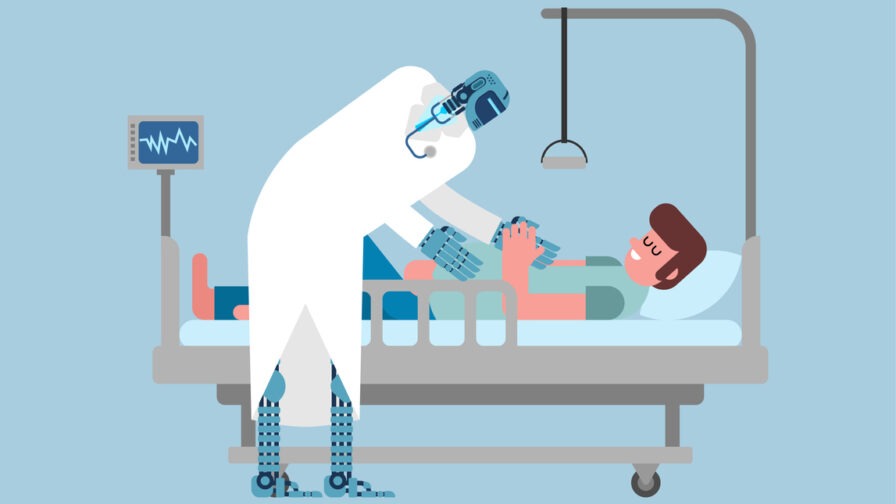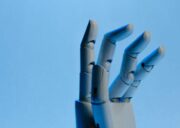
This article about the influence of AI in medicine and the creation of "AI Doctors" is based on insights from Devs Meet Ethics, a series by AI expert Mauro Bennici for Codemotion.
AI: assistant or replacement?
How would you feel about being treated by a robot medic? Do you think robots could diagnose and treat illnesses as accurately as human doctors? These questions, as many others when it comes to AI, are no longer part of the science fiction genre. They are a reality that’s already taking place right now with experiments and real-case scenarios.
AI tools have been employed in various medical cases to provide precision and accuracy beyond what humans are capable of. However, this technology comes with different ethical implications which can contradict our initial ideas of how it should be used.
During one of his Devs Meet Ethics episodes, Mauro Bennici explains one experience he personally had, in which an “AI Medic” (a machine learning application) and a human physician had to diagnose a patient without the human knowing the machine’s result. A third doctor would be requested for another opinion if no agreement could be made between the doctor and the “machine”.
The ideal situation is that AI-based tools should always provide additional support to the physician, and not become a replacement or substitute. Clearly, AI is showing its worth as a valuable tool in assessing medical cases – but it’s still important to remember to keep it in its place.
Who controls AI Doctors?
Supervisory bodies are concerned that AI tools could de-empower the role of physicians and allow anyone to request a diagnosis and initiate treatment. While AIs have the advantage of being unbiased, they lack the ability to accurately analyze complex or new situations as it is only able to categorize what it has been trained on, (which, paradoxically, can create other types of bias).
Unfortunately, this means AIs are ineffectual when it comes to intricate factors like patient observations, listening and empathizing which are essential elements for any reliable diagnosis. At this point, it is clear that there is no replacement for a skilled physician who can recognize all these nuances and work towards better outcomes.
The advantages of AI doctors
A recent study published in China about AI and medical collaboration showed impressive results, with a doctor and AI performing better together than each one alone. This gives us great hope for the possibilities of what technology can do for our health, from providing remote care with 5G networks to creating more accurate vaccines faster than ever before.
Here are some of the main conclusions and benefits mentioned in the study:
• Medical AI provides high efficiency, surgical accuracy, potential to adapt to complex environments, and improved diagnosis and treatment efforts
• Open-source sharing data, patient information, and data integration is possible with AI platforms. • Telemedicine technology offers potential to provide services in isolated areas plus the ability to exchange medical information and provide telementoring for education or patient care.
• Utilizing AI technologies may lead to innovative medical services with increased clinical value for patients.
But AI doctors can also be used in remote or lesser-managed areas, where access to healthcare quality is difficult or impossible without them. The power of collaborative work between humans and machines could potentially revolutionize healthcare around the world, giving us possibly life-saving solutions that have never been within reach before.
The human and economic factor
AI doctors provide a way for institutions to monitor diagnostics for diseases and illnesses in an efficient manner. With the implementation of numerical limits- both too high and too low- hospitals, health insurance companies and other such facilities can decide when to send out an alert based on individual patients’ data.
Depending on whether it is public or private, a healthcare facility may be able to modify the thresholds accordingly. However, a lower threshold will mean more tests being conducted and more medical bills to pay– though this choice will also lead to a better chance at preventing potential life-threatening cases from slipping through the cracks. At the same time, higher thresholds will see far fewer examinations but run at greater risk of undetected illnesses due to increased false negatives.
The challenge of setting these boundaries lies in making sure the right decisions about safety versus cost are made; either way it can make all the difference in an individual’s life.
Conclusions
To sum up, the possibilities of AI in medical technology are tremendous and are already having many positive effects on the healthcare industry. We have seen that these tools can detect anomalies and alert doctors in terms of diagnostics and assist with precise surgery for patients thanks to amounts of data that no human could amass.
With such potential though there comes a strong sense of responsibility as well to not just rely solely on AI but to integrate it with human capabilities. We must tread firmly and carefully towards this space as AI is no replacement for a human doctor or any practitioner. The integration between machines and humans is the most beneficial yet complicated one, and subjects us all to a delicate balance between technological advances and mankind’s capabilities.
At this juncture, it then remains for us to make well-informed decisions about our collaboration with machines, weigh their applications in our everyday lives carefully, understand the implications of using these tools, and above all ask ourselves the initial question – are you ready to let an AI doctor treat you?




